Recent Articles
Popular Makes
Body Types
10 Safest Electric Cars
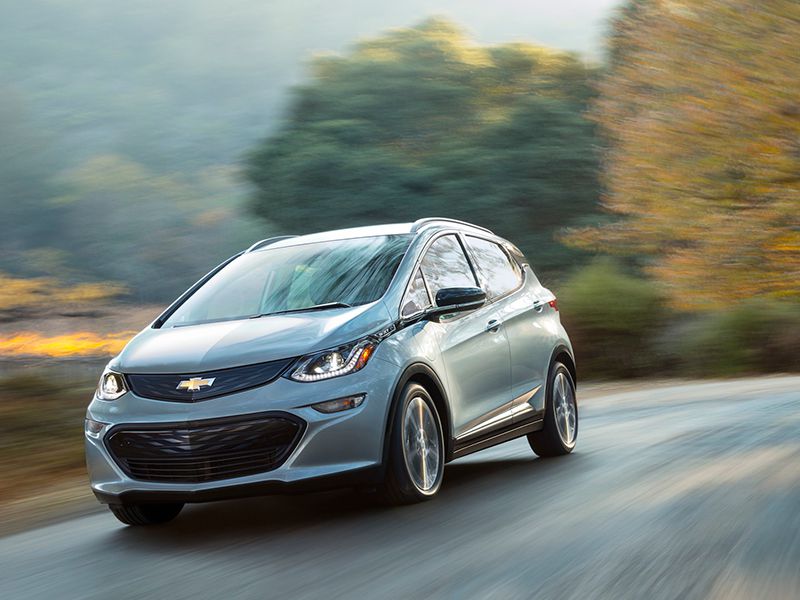
2017 Chevrolet BoltEV Profile ・ Photo by General Motors
Finding the safest electric cars is particularly important in today’s automotive marketplace. After all, as more EVs take to U.S. roads, more of them will be at risk for crashes. As our research indicates, many electrified vehicles are lacking both the top safety grades from NHTSA and the IIHS and some of the industry’s most popular driver-assistance features. Our current gallery, however, does list a few impressive safety performers, and we’ve even put them first, to show which vehicles set the bar for occupant protection and driver assistance.
Also, to assist shoppers with a wider range of safer options, we’ve included plug-in hybrids that combine significant all-electric driving capability with onboard gasoline-powered range extenders. (Note: because the IIHS 2018 Top Safety Pick vehicles had not been announced when this gallery went to press, we’ve relied on results from the 2017 IIHS testing program.)
2017 Chevrolet Bolt
Our gallery of the safest electric cars includes the newest one from the Bowtie brand: the 2017 Chevrolet Bolt. True, Chevy’s high-efficiency hatchback has yet to be tested by NHTSA, but it has earned a Top Safety Pick recognition from the IIHS. Further, the Bolt comes standard with a rearview camera and offers side blind-zone alert, rear cross-traffic alert, forward collision alert, and forward pedestrian alert as options. Nor is there any shortage of infotainment technology for the Bolt, which provides mobile Wi-Fi, Android Auto and Apple CarPlay as standard equipment. The car then seals the deal with a 238-mile all-electric driving range and EPA ratings of 128 MPGe city/110 MPGe highway/119 MPGe combined.
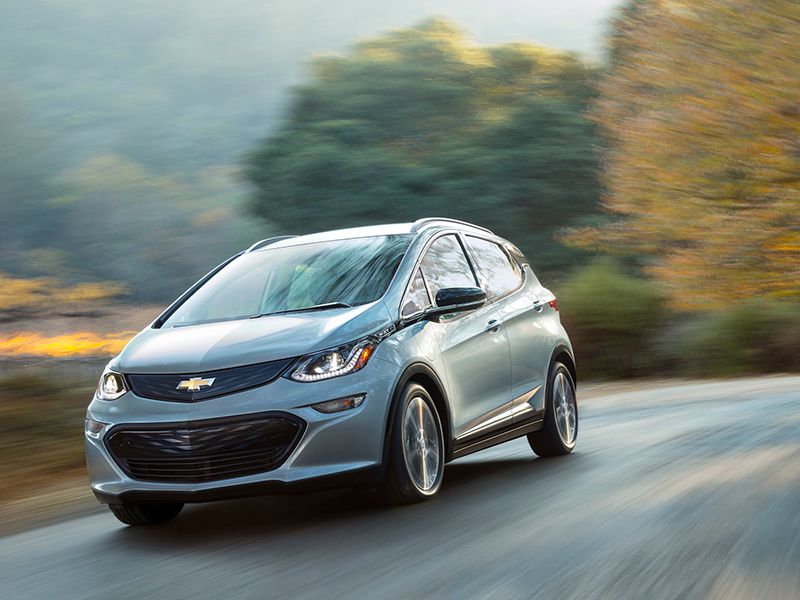
Photo by General Motors
2018 Chevrolet Volt
Another of the safest electric cars comes from Chevy with the 2018 Chevrolet Volt. The Volt is a plug-in hybrid that can be driven more than 50 miles on a single charge when in EV mode. But that’s just for starters, and it also has an onboard range-extending gas engine that can power the car for almost 390 additional miles. In either mode, the Volt showcases a full Top Safety Pick+ rating from the IIHS and a 5 Star Overall Safety Score from NHTSA, with the highest possible honors in all facets of testing for both programs. Important as well is the Volt’s standard and available safety technologies, such as a rearview camera, forward automatic emergency braking, and adaptive cruise control.
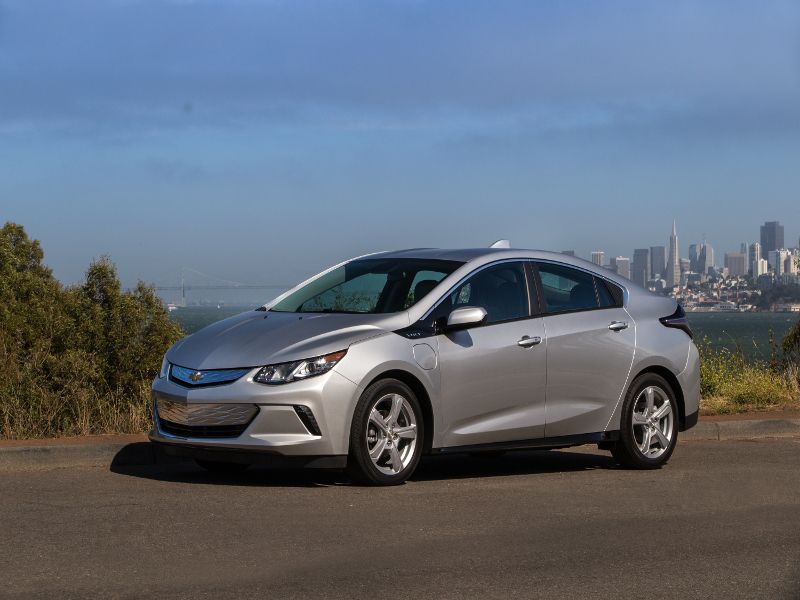
Photo by General Motors
2017 Tesla Model X
Despite Tesla’s undeniable expertise with electric powertrains and automated driving technologies, the brand doesn’t have the proven track record of testing success as some of our safest electric cars. Only the 2017 Tesla Model X, the company’s crossover, has top grades from either of the two primary safety groups. That said, the vehicle’s 5 Star Overall Safety Score from NHTSA is supported by five-star ratings in each individual testing procedure. The standard safety package for the Model X also bundles driver-assistance measures like automatic emergency braking, lane-departure warning, and all the hardware for Tesla’s AutoPilot self-driving system. In terms of all-electric driving, the Model X is EPA-certified with a range of up to 289 miles on a full charge.
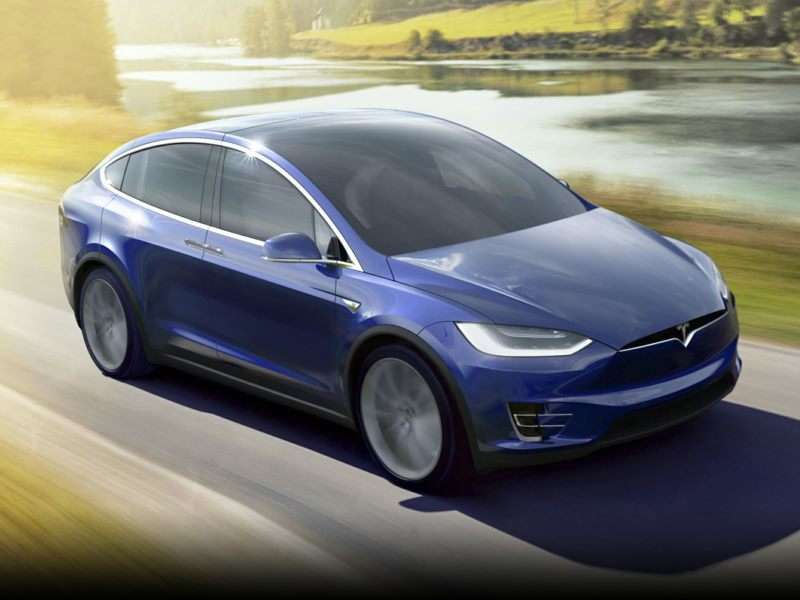
Photo by Tesla
2017 Toyota Prius Prime
If you’re shopping for the safest electric cars, you will definitely want to consider the 2017 Toyota Prius Prime. It’s essentially a plug-in hybrid version of the iconic Prius that delivers a 25 mile all-electric driving range with an EPA rating of 133 MPGe in combined travel. Next, for longer trips, the car’s gas-hybrid powertrain can take over and extend that range by an extra 615 miles, with an EPA rating of 54 mpg in combined driving. And regardless of how far you go, the Prius Prime brings with it a Top Safety Pick+ certification from the IIHS and standard tech resources like pedestrian detection, automatic emergency braking, and adaptive cruise control.
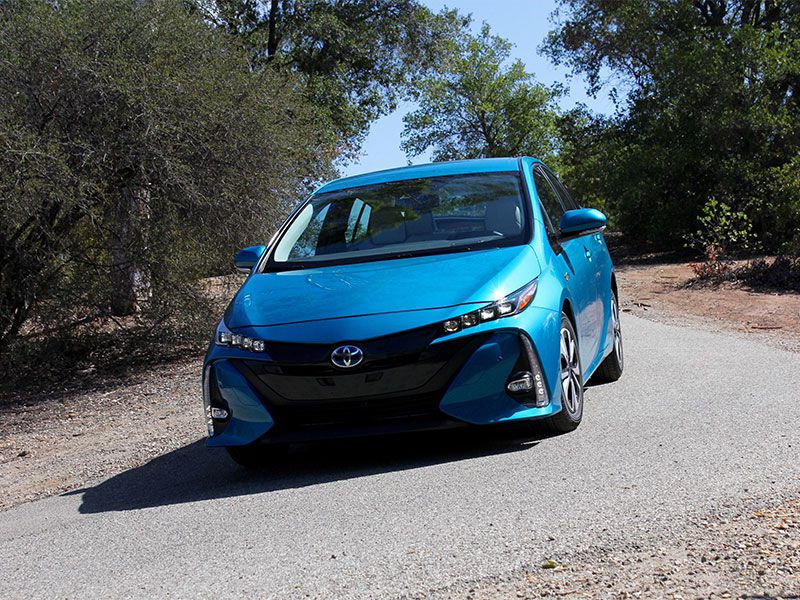
Photo by Toyota
2018 Volkswagen e-Golf
The 2018 Volkswagen e-Golf is probably more in line with traditional ideas about the safest electric cars since it’s actually an electric car, not a plug-in or crossover or both. Indeed, the e-Golf serves up a zero-emissions all-electric driving range of 125 miles, complemented by EPA ratings of 126 MPGe city/111 MPGe highway/119 MPGe combined. As for the car’s safety ratings, the e-Golf (like many full EVs) has not been individually tested by either the IIHS or NHTSA. But the e-Golf is based on the “regular” Golf, and that car is a Top Safety Pick according to the former, and it received a 5 Star Overall Safety Score from the latter.
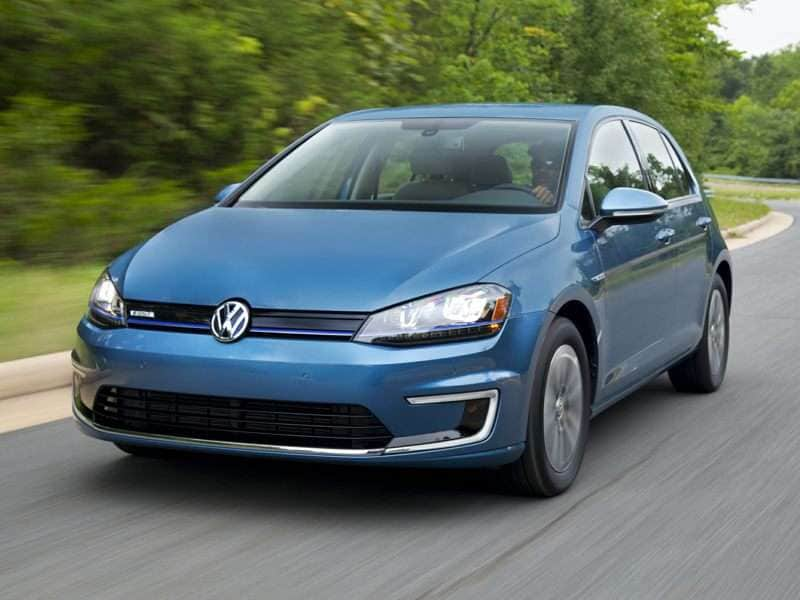
Photo by Volkswagen
2018 Ford Fusion Energi
The safest electric cars with gas-powered range extenders also include the 2018 Ford Fusion Energi. Building on the safety ratings of the standard Fusion, which is an IIHS Top Safety Pick and has a 5 Star Overall Safety Score from NHTSA, the Energi model is configured with a plug-in hybrid powertrain. As a result, owners benefit from a 2l-mile driving range on electricity alone, plus about 590 extra miles of range when depending on gasoline. Of course, even then, not much gasoline is needed, because the Fusion Energi can achieve 42 mpg in combined travel in that mode. Ford also offers a full line of high-tech safety content for the vehicle, from a pre-collision system to a blind-spot monitor.

Photo by Ford
2018 Kia Optima
The 2018 Kia Optima follows the same pattern as many of the safest electric cars from the mainstream automakers. That is, it’s a plug-in hybrid version of a safe and popular midsize sedan. The Optima plug-in hybrid, for instance, is based on the same Optima that earned Top Safety Pick+ certification and a 5 Star Overall Safety Score, all while earning the highest grades in all individual testing categories—from both organizations. The Optima plug-in’s grades from the EPA are likewise impressive. Among the highlights are a 29-mile EV driving range and more than 580 miles of gas-powered driving capability. Meanwhile, tech highlights extend to a forward collision warning system, adaptive cruise control, and blind-spot detection.
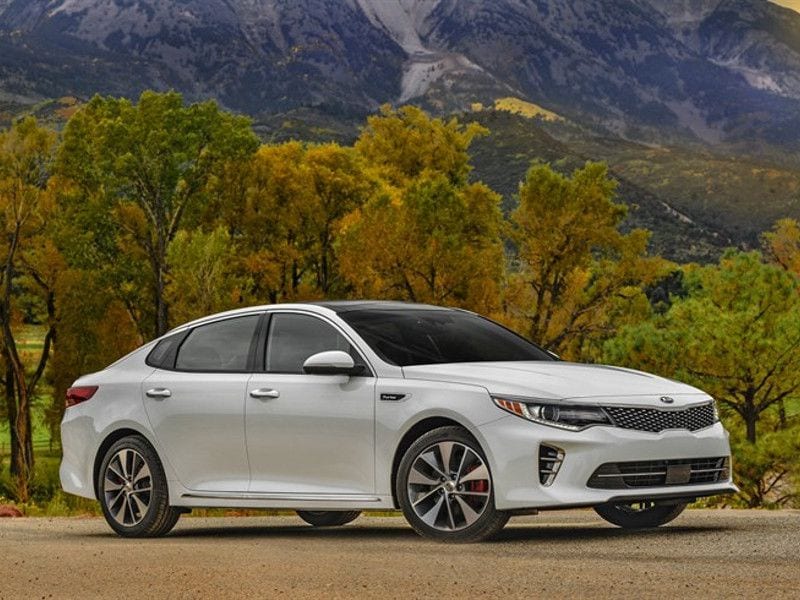
Photo by Kia
2018 BMW 5 Series
Although people usually don’t think of BMW when they think of the safest electric cars, the company does have some strong candidates for the honor. Yet with long-range EVs like the BMW i3 and i8 not tested by either NHTSA or the IIHS, our choice as the Ultimate Driving Machine with the ultimate combination of safety and electricity is from the 2018 BMW 5 Series family. It’s the 530e iPerformance sport sedan, thanks to a 16-mile all-electric driving range, 345 miles of gas-powered range, and 0-60 times of 6 seconds flat. Meanwhile, when it’s time to concentrate on safety, owners can be confident in knowing the 5 Series has a Top Safety Pick+ recognition from the IIHS.
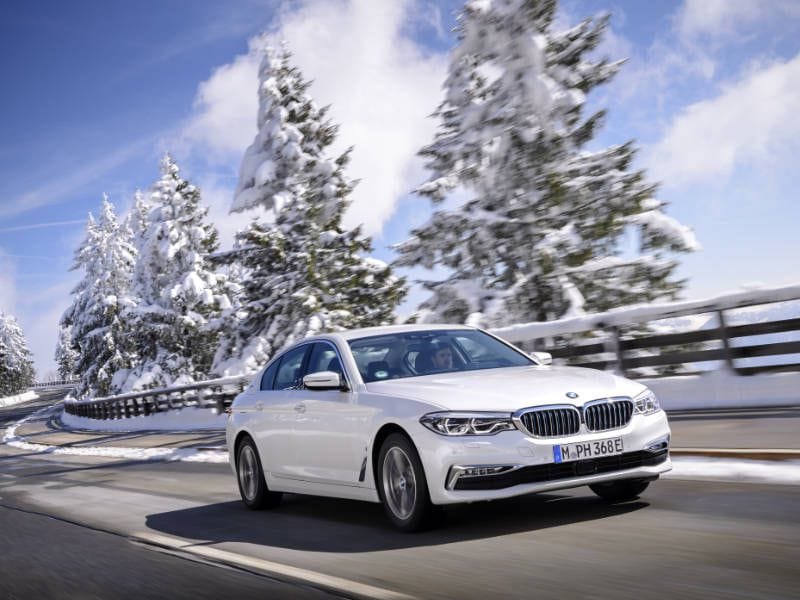
Photo by BMW
2017 Tesla Model S
We couldn’t finish our gallery of the safest electric cars without at least mentioning the segment’s best seller. Just remember that the 2017 Tesla Model S hasn’t been tested by NHTSA, and because it was awarded an “Acceptable” grade in the small front-overlap crash test (instead of a “Good” mark,) it’s not an IIHS Top Safety Pick either. On the other hand, the Model S does feature safety technologies like a collision-avoidance system, automatic emergency braking, and the latest Tesla AutoPilot functionality, along with an EPA-certified all-electric driving range of up to 335 miles. For longer trips, access to Tesla’s 7,320 Superchargers is standard and allows owners to “fill up” with enough electricity for 170 miles of driving in about 30 minutes.
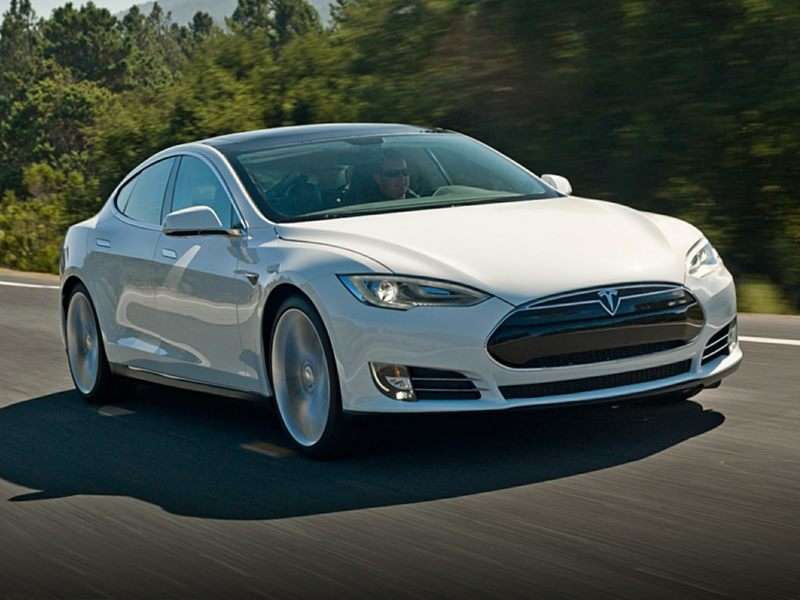
Photo by Tesla
2018 Nissan Leaf
The 2018 Nissan LEAF earns its way into our gallery of safest electric cars based primarily on our best hopes. The 2017 Leaf wasn’t tested by NHTSA, and when it was evaluated by the IIHS, that model didn’t earn Top Safety Pick status. However, the 2018 Leaf will be an all-new model, giving Nissan a chance to try again. In addition, the Leaf will be available with driver-assistance measures such as automatic emergency braking, a blind-spot monitor, rear cross-traffic alert, and Nissan’s sophisticated ProPILOT Assist for hands-on self-driving functionality in certain scenarios. At the same time, the Leaf’s all-electric driving range is expected to grow to 150 miles on a single charge.
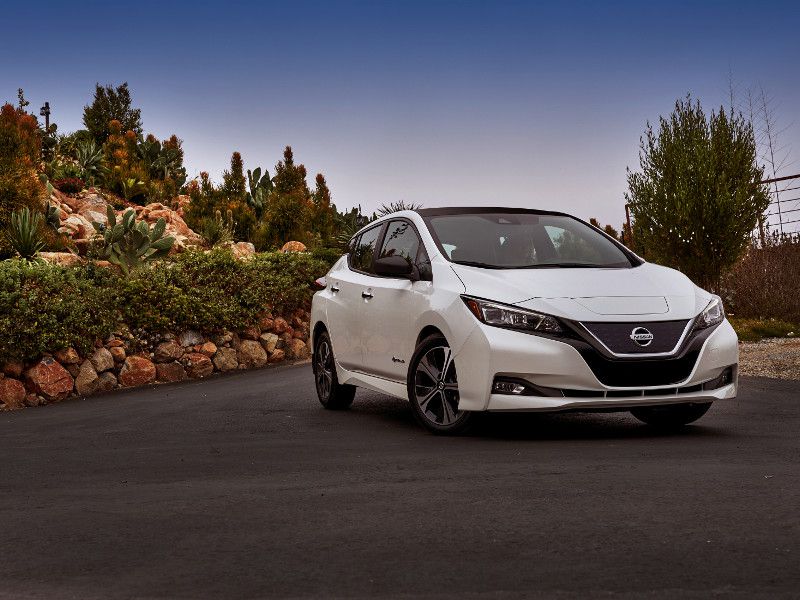
Photo by Nissan